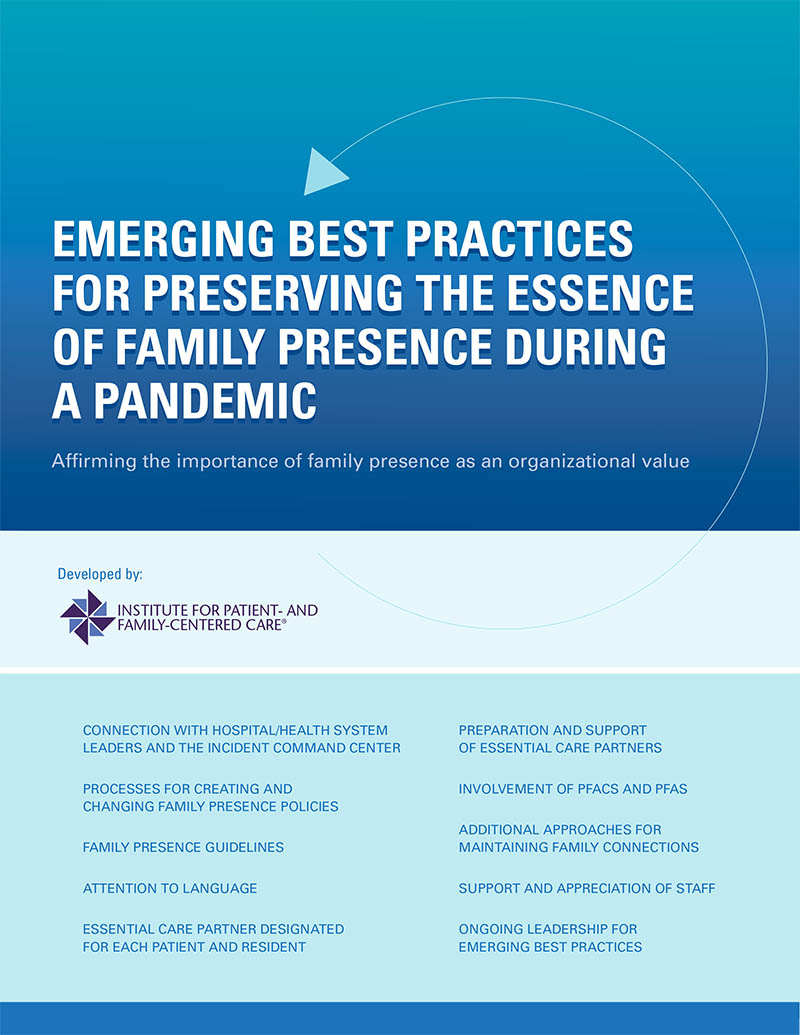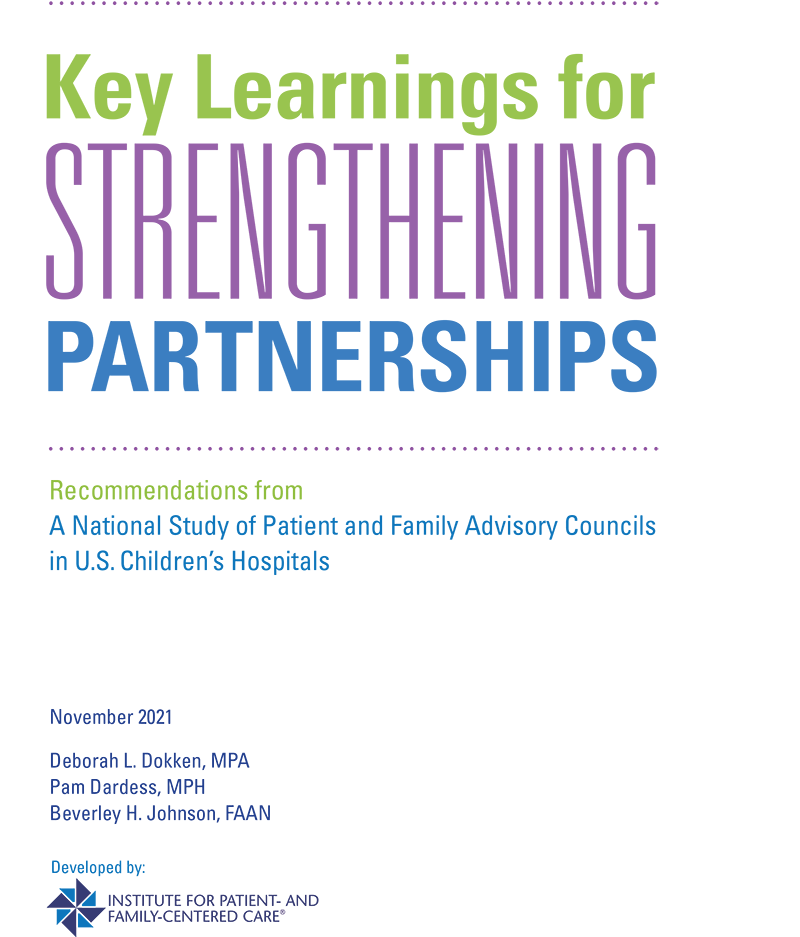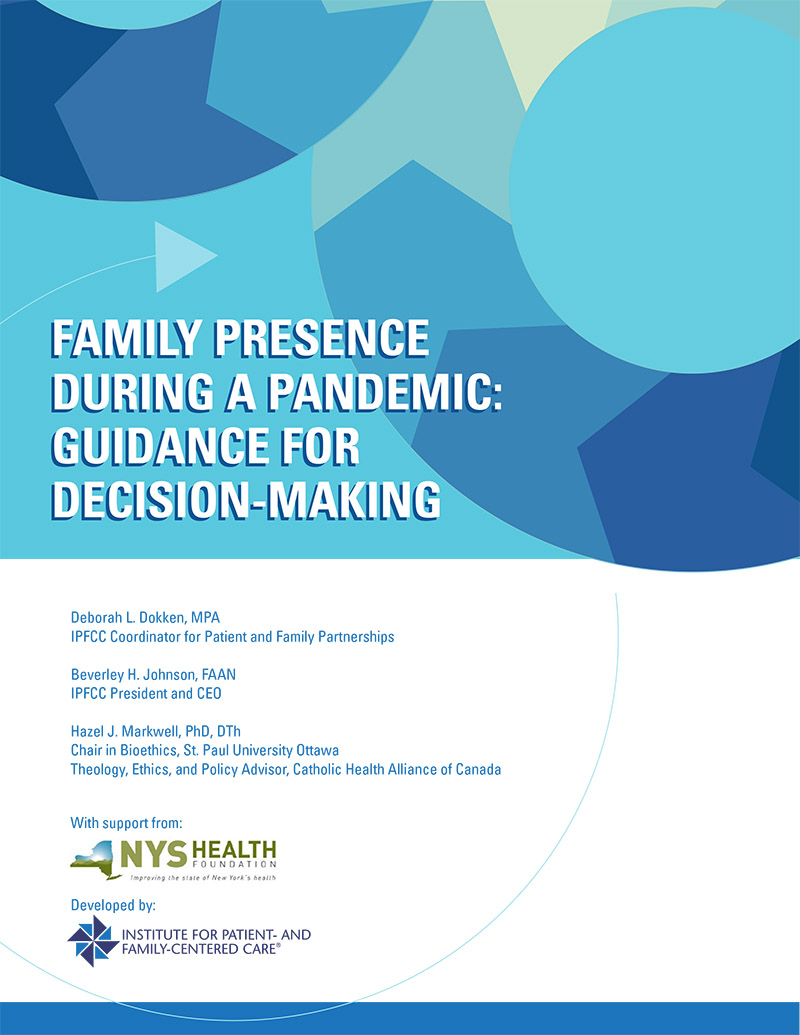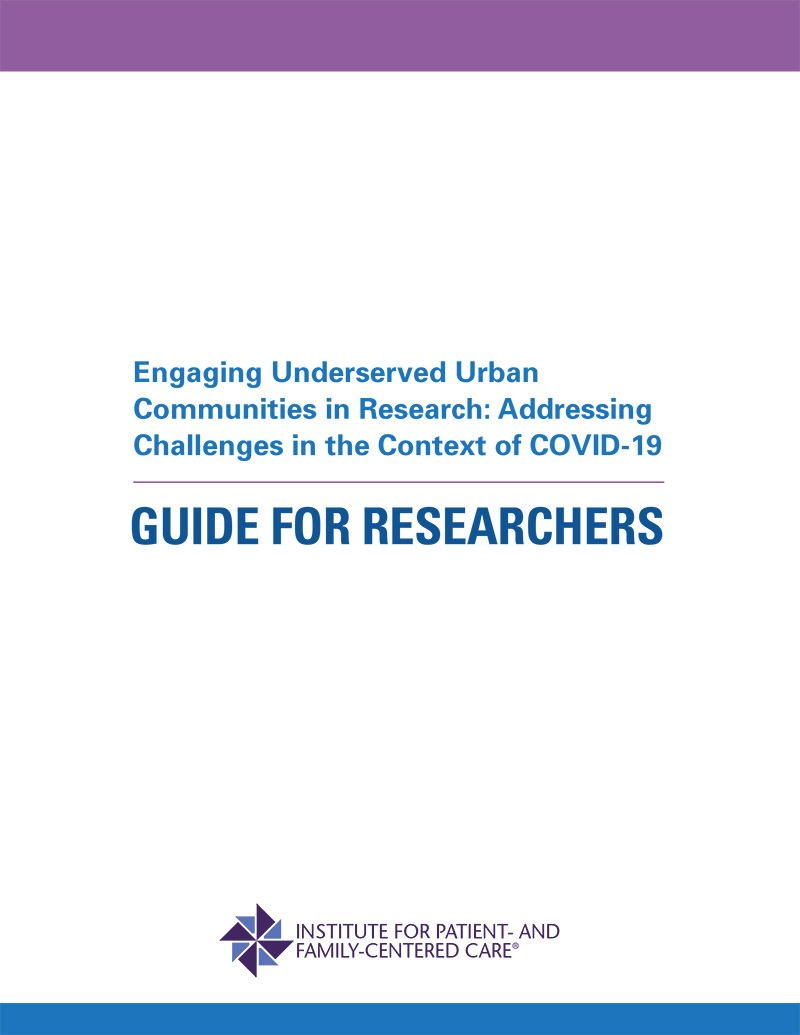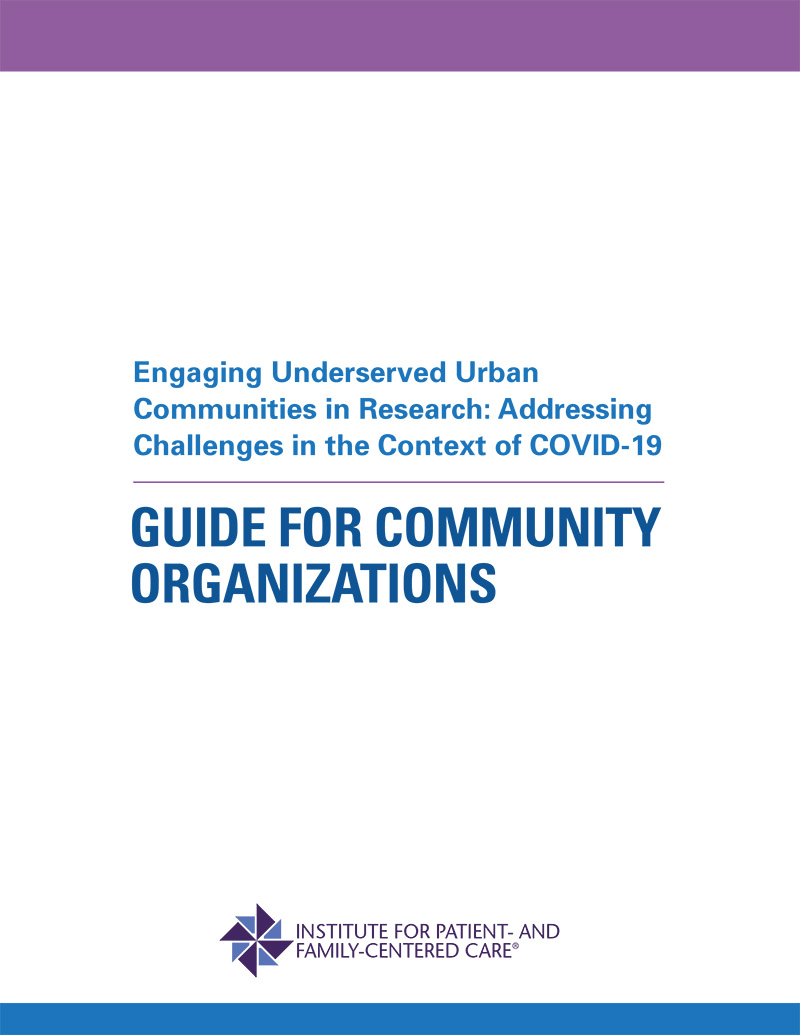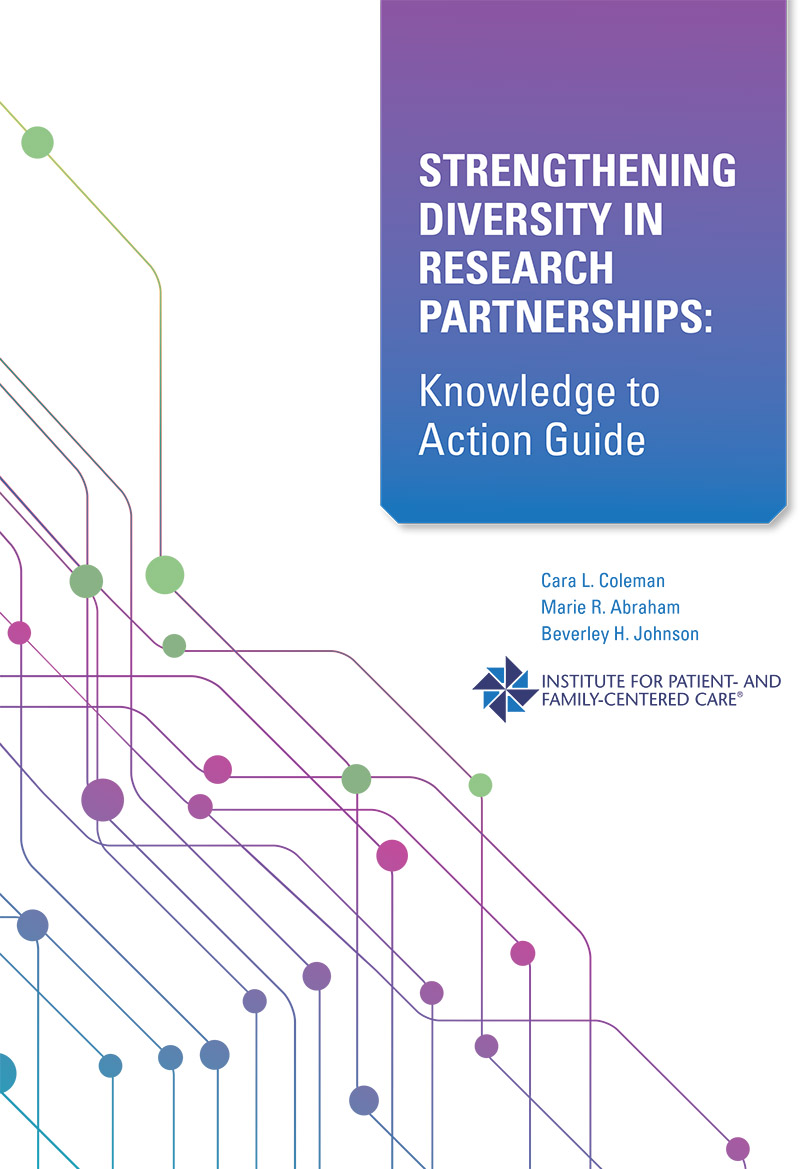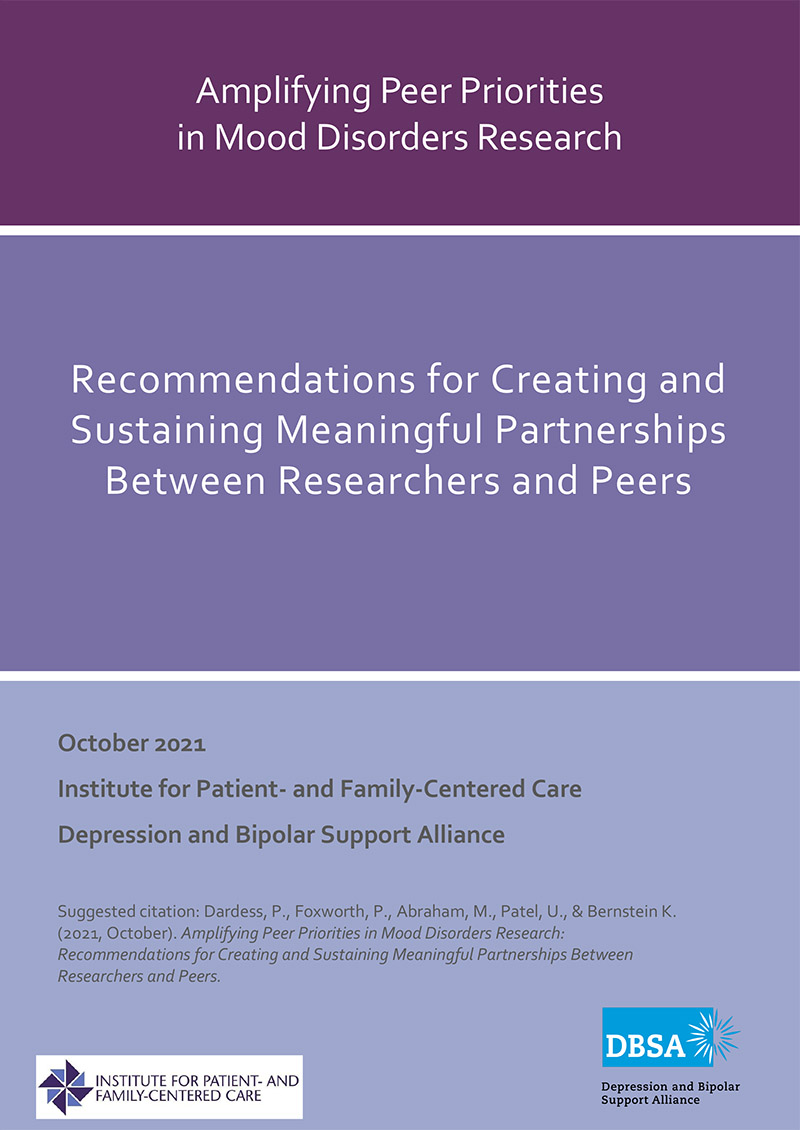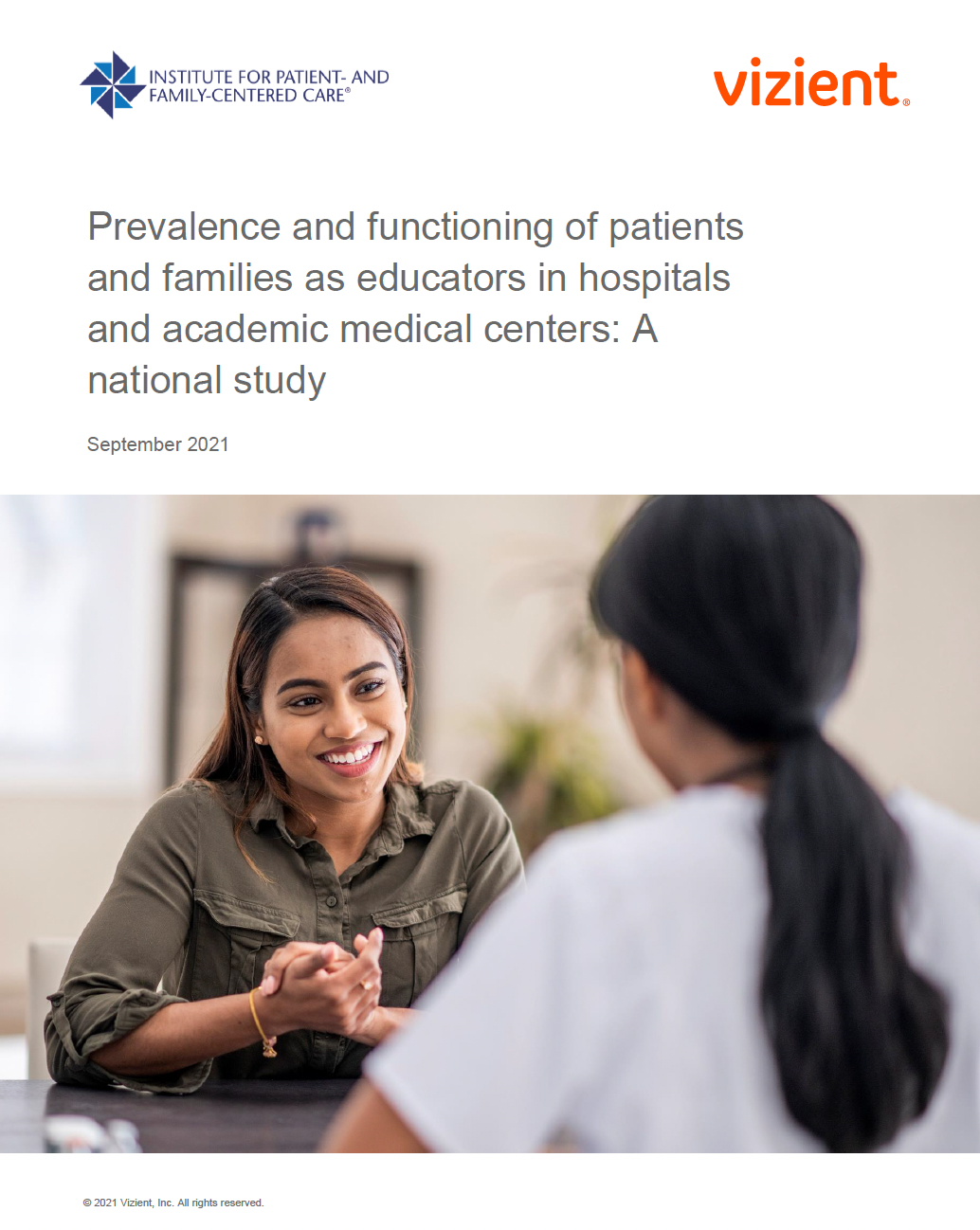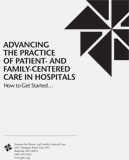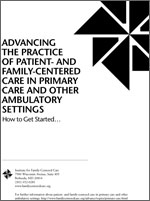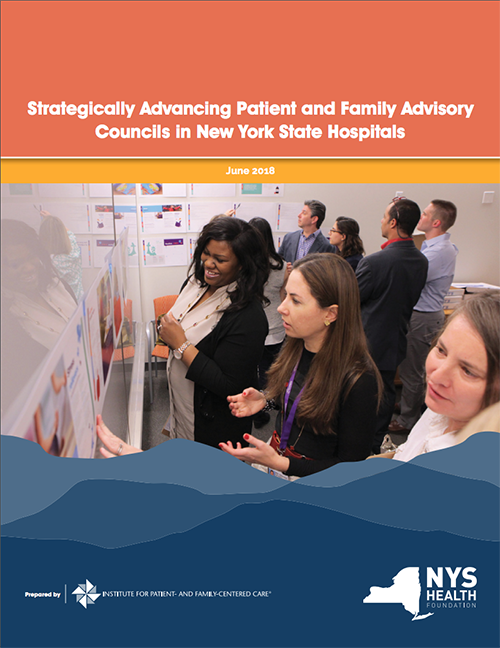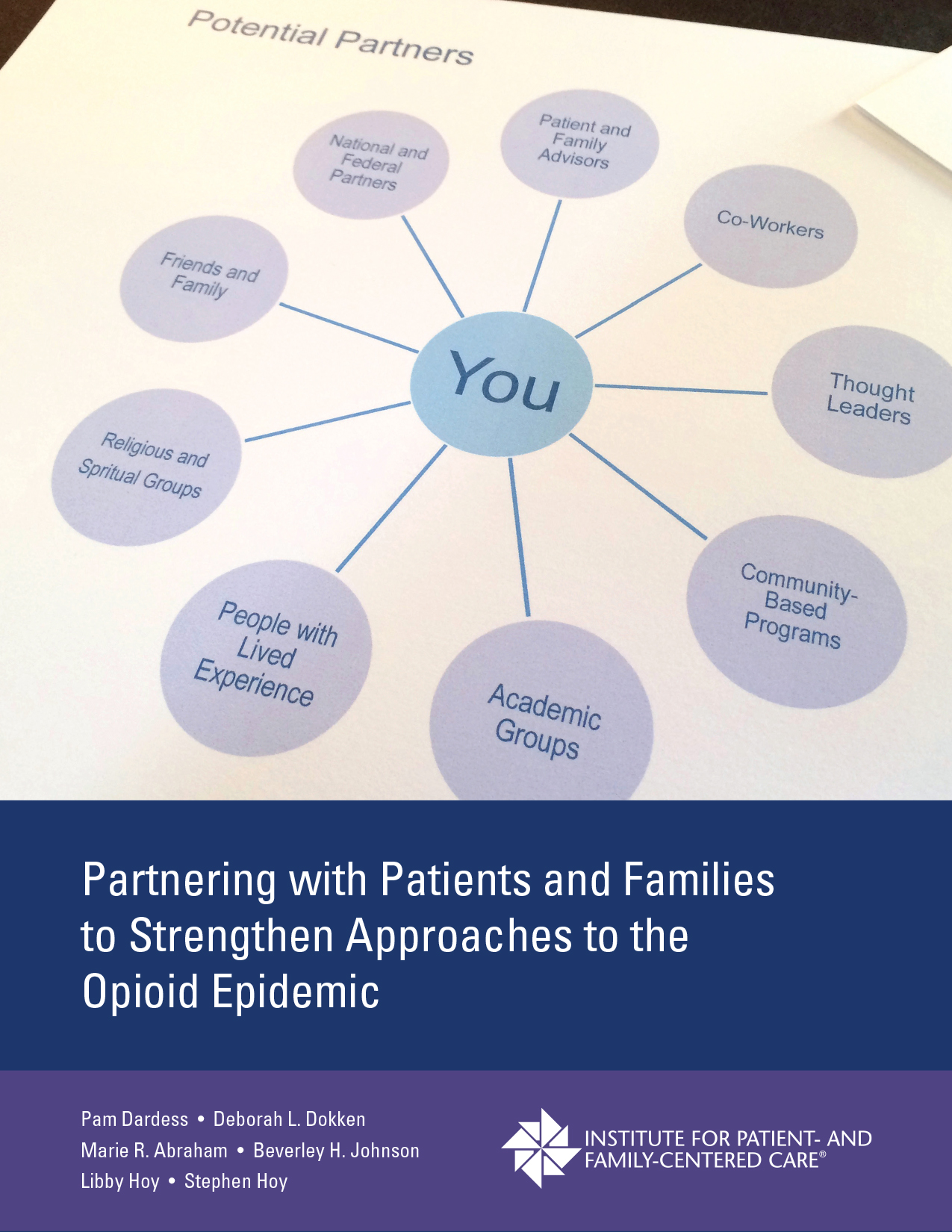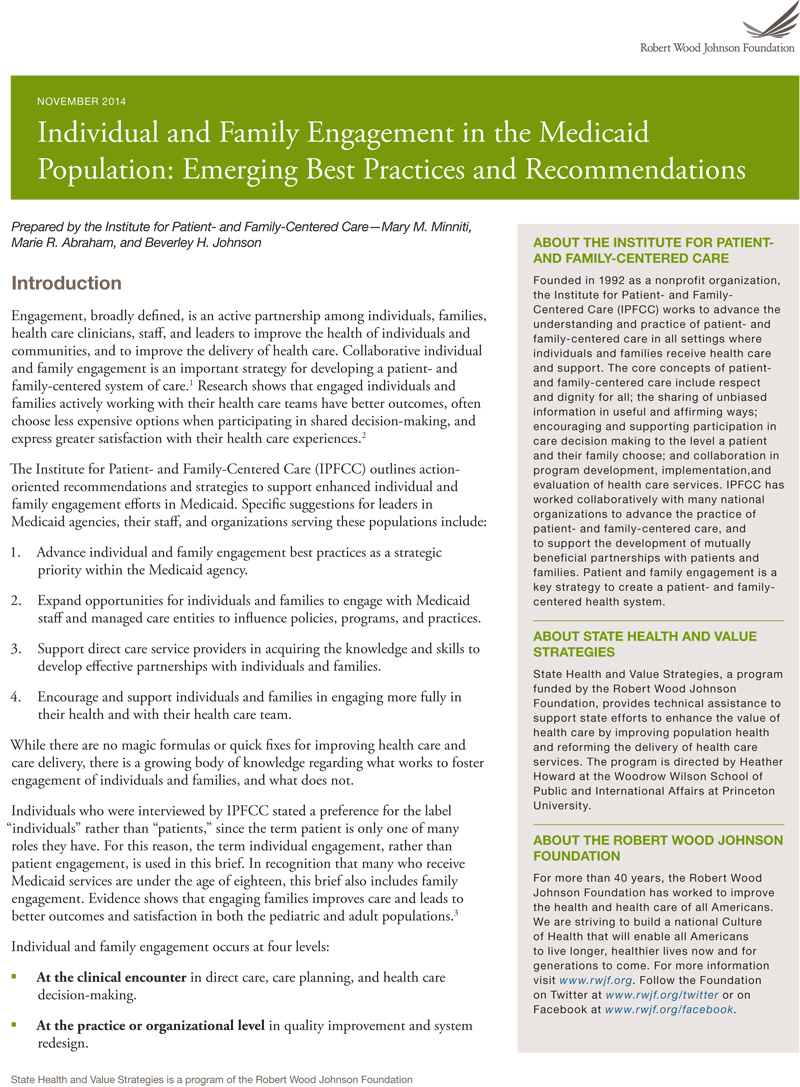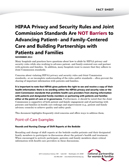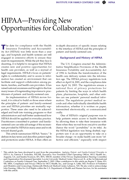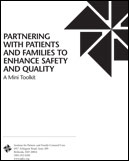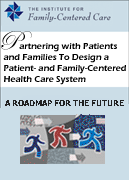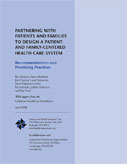Free Downloads - Reports/Guidance Resources/Roadmaps
See also: Free Downloads: Tools/Checklists
IPFCC produces resources on a wide array of topics. The resources listed below are available for you to download and use to advance patient- and family-centered care and strengthen partnerships with patients and families in your organization.
We encourage sharing of our resources for educational purposes. Read More about IPFCC’s policy for reproducing and reprinting documents.
Emerging Best Practices for Preserving the Essence of Family Presence During A Pandemic
Since the beginning of COVID-19, IPFCC has been creating new resources and networking opportunities for the field focused on maintaining patient- and family-centered care and its fundamental partnerships during the pandemic. A key issue we have addressed is family presence. With the advent of the Omicron variant, new restrictions on family presence were introduced. Building on January’s PFCC.Connect Informal Conversation and information gathered from hospitals and organizations, IPFCC developed a new resource, Emerging Best Practices for Preserving the Essence of Family Presence During a Pandemic. The examples in the resource show true commitment to family presence – and creativity in finding safe strategies to support families as essential care partners.
Key Learnings for Strengthening Partnerships: Recommendations from A National Study of Patient and Family Advisory Councils in U.S. Children’s Hospitals
IPFCC led a study in collaboration with Cincinnati Children’s Hospital Medical Center, exploring the prevalence and characteristics of PFACs in children’s hospitals as well as factors contributing to their effectiveness. Based on the study findings, this resource highlights key learnings and recommendations to provide practical guidance for strengthening partnerships with patients and families. It is intended for hospitals that are developing PFACs—and also for those with well-established councils that might benefit from new wisdom from the field.
Family Presence During a Pandemic: Guidance for Decision-Making
As more has been learned about the COVID-19 pandemic, the serious harms of restrictions on family presence are being recognized. As part of this growing effort and consistent with its long history as a champion for family presence and participation, IPFCC, in collaboration with a Canadian ethicist, has developed a new resource, “Family Presence During a Pandemic: Guidance for Decision-Making.” This free resource provides tools to help organizations re-visit their policies and achieve a better balance between benefits and harms for patients, families, clinicians, and communities.
Engaging Underserved Urban Communities in Research: Addressing Challenges in the Context of COVID-19: Guide for Researchers
IPFCC partnered with Smart from the Start, a community-based organization serving the most underserved neighborhoods in Washington, DC and Boston, MA, to identify challenges to engaging similar communities in research during the time of COVID-19 and offer recommendations to address the challenges. This Guide was developed to provide insights from community members and community organizations and offer strategies to researchers to build and sustain authentic and respectful partnerships.
Engaging Underserved Urban Communities in Research: Addressing Challenges in the Context of COVID-19: Guide for Community Organizations
IPFCC partnered with Smart from the Start, a community-based organization serving the most underserved neighborhoods in Washington, DC and Boston, MA, to identify challenges to engaging similar communities in research during the time of COVID-19 and offer recommendations to address the challenges. This Guide was developed to provide insights from community members and community organizations and offer strategies for organizations to proactively initiate, implement, and sustain partnerships with researchers.
Strengthening Diversity in Research Partnerships: Knowledge to Action Guide
As part of a PCORI-funded project, IPFCC expanded PCORI’s Principles of Engagement to recognize and address the unique circumstances that arise when partnering with diverse and under-represented communities in research. The expansion was based on the lessons learned about meaningful and authentic engagement from researchers, clinicians, and patient/family/community partners. This resource shares descriptions of the expanded principles, strategies, and examples from the field.
Recommendations for Creating and Sustaining Meaningful Partnerships Between Researchers and Peers
IPFCC and the Depression and Bipolar Support Alliance hosted a virtual convening in June 2021. Thirty participants, including peers, mental health advocacy organizations, clinicians, and researchers, provided input to inform research that can better address priorities of those affected by mood disorders (peers). This resource contains recommendations for promoting and supporting meaningful partnerships between peers and researchers. It is not intended to be a “how to” guide, but to raise issues that should be discussed and considered for effective peer-researcher partnerships.
Prevalence and Functioning of Patients and Families as Educators in Hospitals and Academic Medical Centers: A National Study
Patients and families bring unique expertise to a multitude of initiatives in health care, including the education of professionals, students, and trainees. Yet the understanding of patient and family faculty programs is limited. In 2020, Vizient and IPFCC conducted a survey of 67 health care organizations to explore the prevalence and functioning of patients and families as educators in hospitals and academic medical centers. This report shares results of the survey and highlights best practices and opportunities for improvement. IPFCC’s work was supported in part by the New York State Health Foundation.
Advancing the Practice of Patient- and Family-Centered Care in Hospitals: How to Get Started...
The Institute for Patient- and Family-Centered Care is pleased to offer guidance for how to get started in advancing the practice of patient- and family-centered care and in creating effective partnerships with patients and families with this new publication, Advancing the Practice of Patient- and Family-Centered Care in Hospitals: How to Get Started...
Advancing the Practice of Patient- and Family-Centered Care in Primary Care and Other Ambulatory Settings: How to Get Started...
What is patient- and family-centered ambulatory care? Why does it matter? How does it fit with our overall mission? And finally, what can our practice or organization do to advance the practice of patient- and family-centered care? Where do we start? Advancing the Practice of Patient- and Family-Centered Care in Primary Care and Other Ambulatory Settings: How to Get Started... was developed to provide answers to these questions.
Strategically Advancing Patient and Family Advisory Councils in New York State Hospitals
This report describes the findings of a study of New York State PFACs' performance and impact on hospital strategy and operations and correlation with experience of care and safety outcomes. It also verifies the importance of many existing best practices, both in relation to creating a supportive environment and culture in which a PFAC can thrive and in relation to the operation and work of a PFAC itself.
Diverse Voices Matter: Improving Diversity in Patient and Family Advisory Councils
Many hospitals and clinics struggle with building patient and family advisory councils that reflect the diversity of the communities they serve. Kendra Jones, a DNP student in Health Innovation and Leadership at the University of Minnesota, developed this resource in collaboration with IPFCC and five PFACs across North America to provide strategies to increase and sustain diversity.
Partnering with Patients and Families to Strengthen Approaches to the Opioid Epidemic
IPFCC, in partnership with PFCCpartners, convened a multistakeholder Patient and Family Advisor Summit on the Opioid Epidemic in 2018. This white paper summarizes the presentations and discussions from the Summit. It also provides recommendations and guidance to strengthen collaboration with patients and families, especially individuals who are in recovery, live with acute and chronic pain that is managed with opioids, have active substance use disorder, and families of those affected, to address the epidemic.
Individual and Family Engagement in the Medicaid Population: Emerging Best Practices and Recommendations
With sponsorship from the Robert Wood Johnson Foundation's State Quality and Value Strategies program, IPFCC conducted a targeted literature review and interviewed over 50 individuals. Based on what was learned, IPFCC developed this issue brief. The brief outlines best practices and suggested recommendations and strategies to support enhanced individual and family engagement efforts by Medicaid agencies, their staff, and organizations serving these populations.
Changing Hospital "Visiting" Policies and Practices: Supporting Family Presence and Participation
The Institute for Patient- and Family-Centered Care formed a working group composed of health care leaders, staff, and patient/family advisors, all with expertise in patient- and family-centered care, to develop a guidelines with respect to changing hospital "visiting" policies and practices. Their recommendations are found in the accompanying document, in addition to specific comments regarding restrictions on visitation rights, and the format, style, and language used in policies and procedures.
Also included are Appendix A: Members of the Working Group for Changing Hospital "Visiting" Policies And Practices: Supporting Family Presence and Participation; Appendix B: Guidelines for the Presence and Participation of Families and Other Partners in Care - A Template; and a list of References.
Pandemic Planning and Patient- and Family-Centered Care
The Institute for Patient- and Family-Centered Care convened a work group to consider Pandemic Planning and Patient- and Family-Centered Care during the Institute's Hospitals and Communities Moving Forward with Patient- and Family- Centered Care Intensive Training Seminar held in Minneapolis, MN in 2009. Pandemic Planning and Patient- and Family-Centered Care includes suggestions-reflecting patient- and family-centered care-to consider when developing a pandemic response plan.
HIPAA Privacy and Security Rules and Joint Commission Standards Are NOT Barriers to Advancing Patient- and Family-Centered Care and Building Partnerships with Patients and Families
Many hospitals and practices have questions about how to abide by HIPAA privacy and security rules while also working to advance patient- and family-centered care and partner with patients and families. In addition, many hospitals want to ensure that they adhere to Joint Commission standards.
Concerns about violating HIPAA privacy and security rules and Joint Commission standards—or an incomplete understanding of the rules and/or standards - often prevent the sharing of important information with patients and families.
It is important to note that HIPAA gives patients the right to see and receive a copy of their health information; there is no wording within the HIPAA privacy and security rules or the Joint Commission standards that prohibits health care providers from sharing information with patients and designated family members or partnering with patients and families either at the point-of-care or in governance. Furthermore, it should be noted that the Joint Commission is supportive of both patient and family engagement and of partnering with patients and families in health care redesign and improvement (e.g., patient and family advisory councils) to achieve quality and safety goals.
HIPAA-Providing New Opportunities for Collaboration
The Federal law, the Health Insurance Portability and Accountability Act (HIPAA), requires confidentiality of medical records and other individually identifiable health information. The Institute of Medicine (IOM) publication, Crossing the Quality Chasm: A New Health Care System for the 21st Century, states that health care must be patient-centered and sets forth several "rules to redesign and improve care," including "shared knowledge and the free flow of information." Can health providers comply with HIPAA while following the IOM recommendations? How can hospitals and health care organizations strike a balance between engaging patients and families in planning care and decision-making-which requires the sharing of information to assure safety and quality of care-while safeguarding patient confidentiality? The free download HIPAA-Providing New Opportunities for Collaboration addresses these questions and more.
Partnering with Patients and Families to Enhance Safety and Quality: A Mini Toolkit
There are countless ways that patients and families can serve as advisors to enhance quality and safety, redesign systems of care, and educate health care professionals and other staff, students, and trainees about safety. Some are formal and ongoing; others are time limited and informal. All are necessary to ensure that care is safe and truly responsive to patient and family needs, priorities, goals, and values. This toolkit contains a myriad of materials for use in partnering with patients and families to enhance safety and quality.
Partnering with Patients and Families to Design a Patient- and Family-Centered Health Care System: A Roadmap for the Future
"Fixing" the problems that plague health care in the United States, most experts now agree, demands system-wide solutions. With support from the Robert Wood Johnson Foundation, the Institute for Patient- and Family-Centered Care collaborated with the Institute for HealthCare Improvement and convened an invitational expert panel to respond to this briefing paper on patient and family partnerships in quality improvement and health care redesign.
Partnering with Patients and Families... Recommendations and Promising Practices
The Institute for Patient- and Family-Centered Care is delighted to announce the release of Partnering with Patients and Families to Design a Patient- and Family-Centered Health Care System: Recommendations and Promising Practices.
This publication, with funding support from the California HealthCare Foundation, is based on the deliberations and key recommendations that emerged from a unique meeting convened by the Institute for Patient- and Family-Centered Care in collaboration with the Institute for Healthcare Improvement and funded by the Robert Wood Johnson Foundation. Highlighted are examples of best practices drawn from hospitals, ambulatory programs, medical and nursing schools, funders of health care, patient- and family-led organizations, and other health care entities. These organizations are making exemplary progress in partnering with patients and families to enhance quality and safety and to improve the experience of care. (For more information on the meeting, see Partnering with Patients and Families... A Roadmap for the Future, listed above.)
Policy for Reproducing IPFCC Documents
The Institute for Patient- and Family-Centered Care encourages sharing our materials, therefore authorization to reproduce materials (whole or in part) from our website for education purposes is granted. While permission is not necessary, we request that you indicate: "Reprinted with permission from the Institute for Patient- and Family-Centered Care: www.ipfcc.org."
If you plan to insert IPFCC material into your organization's documents or publications, we ask that you request permission at email: institute@ipfcc.org. Please include your contact information and a description of your proposed use.
